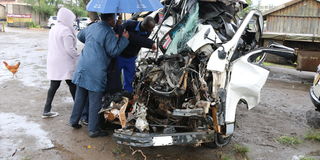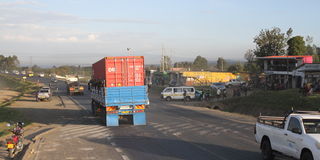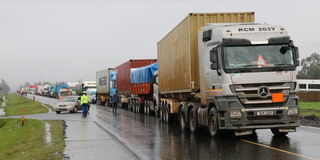Janga la Ngata: The horrific accounts of residents around Ngata black spot

Police at the Kaptwembwa police station inspecting the wreckage of the accident.
There are those who fortunately enough have never had the experience of witnessing a road crash first hand.
The sound of the loud bang as a result of the colliding vehicles, the shattering of glass and the smell of burning rubber, due to one or two of the vehicles having to hit the emergency break while trying to prevent the crash.
Amidst all the chaos, a section of witnesses driven by a need to save human life rush to these horrific scenes.
Here at Ngata black spot, John Kamau, a tout, narrates one of the most horrific scenes that has stayed with him, two years later.

A view of Ngata bridge.
"In 2022, there was a crash that involved two matatus and a trailer. It claimed eight lives. Upon collision, one of the matatus ilibaki imeshikana na side moja ya trailer," he recalls.
He says he, together with other passers-by quickly came in to try and separate the vehicles as there were people who were stuck in the matatu, most of whom had sustained serious injuries.
As is custom, Kamau managed to remove the survivors and bodies from the wreckage, then placed them on the side of the road, waiting for help to arrive.
"Sometimes we flag down the oncoming cars and request them to rush the injured to hospital. Some people offer to help while others don't," he adds.
Asked if he ever feels afraid of seeing an accident scene, Kamau says with a smile, “All that matters to me is stepping in and hopefully saving a life.”
Another resident, Thomas Okeri says he always feared getting near road accident scenes.
However, this changed when he was involved in a road crash some months back and was assisted by good Samaritans who came to his aid.
“Therefore, I see it as returning the favour,” he states.
Okeri says an accident occurred a few months back at the same Ngata blackspot involving a saloon car and a trailer.
"The saloon car had two passengers seated on the front seat. Unfortunately, when the trailer rammed into the car, it killed the driver but the other passenger was still alive screaming for help.
But there was more. In the process of quickly assessing the situation, Okeri noticed that the passengers’ legs were trapped beneath metal.
Alarmed by the increasing amount of smoke emanating from the vehicle, Okeri had to think fast.
“I pulled the lady out of the car since I was afraid the vehicle would burst into flames, but in the process, her leg was torn off at the shin. It was the only way to save her,” he says.

A traffic snarl up occurs along the Ngata stretch following a road crash at the scene.
Okeri admits that he lacks proper first aid training and therefore would never attempt administering any form of medical aid to the victims.
Asked about the notion that some good Samaritans steal from road crash victims, he says, “There are those who at times take advantage of some of the victims and steal their belongings. I would never do that because the thought of having the property of a dead individual would be more traumatizing than the accident scene itself."
Both Thomas and John say that even though the experience is traumatizing, the fact that they have helped a person is very fulfilling.
He recommends the government to set up a first aid centre especially along this black spot just like the one in Salgaa. that will come in handy with regards to first responses in the event of an accident.
"At the point of an accident, every minute counts for the victims. Therefore, the urgency with which one receives medical care is what really determines whether one will live or die," he closes off.


